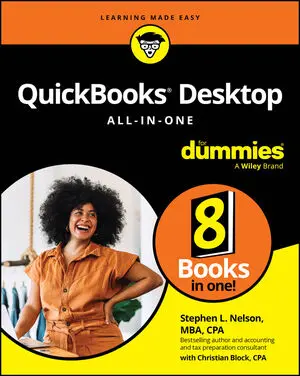Should you be using the desktop version of QuickBooks 2019, or do you need to get with the program and use the online version of QuickBooks? Good question. This author suggests that you work with the desktop version of QuickBooks. This suggestion is based on two factors:
- The desktop version probably becomes significantly more economical over the years you use QuickBooks. Check out a blog about this topic from a CPA firm’s website. The problem with these subscription-type pricing models is that you pay — over time — way, way more for an item. This is true with QuickBooks.
- At least currently, the desktop version of QuickBooks provides more functionality and a richer feature set. Intuit will surely plug the holes in the different versions of QuickBooks. But in the meantime, why pay more for less?)
Note: If your CPA can support your use of QuickBooks simply because you’re using the online version, that may justify the extra cost and lighter feature set.
What QuickBooks does
What does QuickBooks do to help you maintain an accounting system that measures profits and losses and other stuff like that?QuickBooks truly makes business accounting easy by providing windows that you use to record common business transactions. QuickBooks has a window (you know, a Windows window that appears on your monitor’s screen) that looks like a check, for example. To record a check you write, you fill in the blanks of the window with bits of information, such as the date, amount, and person or business you’re paying.
QuickBooks also has a handful of other windows that you use in a similar fashion. It supplies an invoice window, for example, that looks like an invoice you might use to bill a customer or client. You fill in the invoice window’s blanks by recording invoice information, such as the name of the client or customer, invoice amount, and date by which you want to be paid.
Here’s the neat thing about these check and invoice windows: When you record business transactions by filling in the blanks shown onscreen, you collect the information that QuickBooks needs to prepare the reports that summarize your profits or losses and your financial situation.
If you record two invoices (for $10,000 each) to show amounts that you billed your customers, and then you record three checks (for $4,000 each) to record your advertising, rent, and supplies expenses, QuickBooks can (with two or three mouse clicks by you) prepare a report that shows your profit, as shown.
A Profit and Loss Report
| Amount | |
| Revenue | $20,000 |
| Advertising | ($4,000) |
| Rent | ($4,000) |
| Supplies | ($4,000) |
| Total expenses | ($12,000) |
| Profit | $8,000 |
The parentheses, by the way, indicate negative amounts. That’s an accounting thing, but back to the real point of my little narrative.
Your accounting with QuickBooks can be just as simple. In other words, if you record just a handful of business transactions by using the correct QuickBooks windows, you can begin to prepare reports like the one shown in the table. Such reports can be used to calculate profits or (ugh) losses for last week, last month, or last year. Such reports can also be used to calculate profits and losses for particular customers and products.Good accounting gives you a way to manage your business for profitability. And obviously, all sorts of good and wonderful things stem from operating your business profitably: a materially comfortable life for you and your employees; financial cushioning to get you through the tough patches; and profits that can be reinvested in your business, in other businesses, and in community charities.
Let me mention a couple other darn handy things that QuickBooks (and other accounting systems, too) do for you, the overworked business owner or bookkeeper:
- Forms: QuickBooks produces, or prints, forms such as checks and invoices by using the information you enter in those check windows and invoice windows that I mention earlier. So that’s neat, and a true time-saver.
- Electronic banking and billing: QuickBooks transmits and retrieves some financial transaction information electronically. It can email your invoices to customers and clients, for example, which can save you both time and money. And QuickBooks can share bank accounting information with most major banks, making it easy to make payments and transfer funds electronically.






